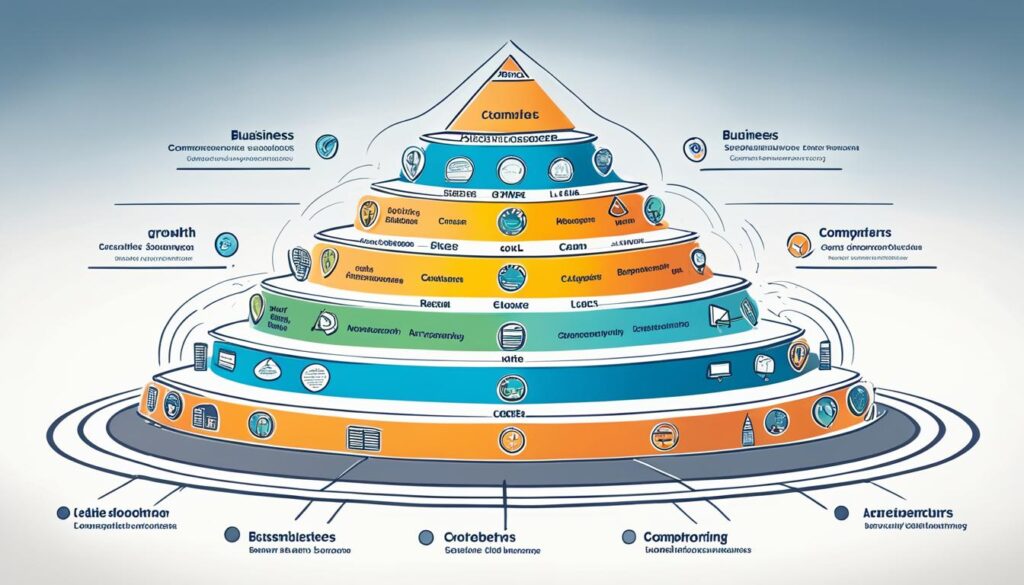At its core, a multilevel marketing company, or MLM, is distinguished by its unique direct selling model. This model operates on the premise that products can and should be delivered directly to consumers, bypassing the traditional retail environments entirely. Delving into understanding MLM structure reveals an intricate network where sales are driven by independent representatives—each cultivating their own businesses, yet intertwined in a broader, cooperative distribution system. These representatives enjoy the autonomy to grow their ranks by recruiting additional distributors, a move that not only extends their reach but also their potential earnings through a hierarchy of commissions.
Such a system demands an in-depth analysis to navigate effectively—the fine line between a rewarding MLM venture and an unprofitable entanglement is often nuanced. Hence, providing MLM success tips becomes crucial not only for aspiring participants but also for the sustainability and legitimacy of the MLM entity itself. Within this fabric, the network marketing explanation becomes evident: it’s about leveraging personal relationships and networks to deliver product value straight to the consumer, filling a niche that traditional models may leave unaddressed.
A deeper understanding of what is multilevel marketing company is vital, especially for those in South Africa seeking new opportunities in the burgeoning direct sales industry. The promise of MLM lies in its capacity to democratize entrepreneurship, yet the responsibility to conduct such business with integrity and transparency cannot be overstated. With this context, our exploration into MLM casts light upon what makes MLMs thrive, the hurdles they face, and the parameters that distinguish legitimate operations from those best avoided.
Key Takeaways
- The essence of a multilevel marketing company lies in its strategy of direct selling, relying on a widespread network of individual sales reps.
- Understanding MLM structure involves recognizing how distributors can earn income both from direct sales to consumers and their recruits’ sales.
- Adhering to the 70% rule is a pivotal legal benchmark for MLMs to ensure they remain legitimate business opportunities and not veer into pyramid scheme territory.
- Key to MLM success is the ability to both sell and recruit effectively within the guidelines of ethical business practices.
- A clear and comprehensive explanation of the network marketing model is essential for those considering entering the MLM field, particularly in regions such as South Africa where the industry is evolving.
- MLMs require an ongoing commitment to learning and adaptation, reflecting the dynamic nature of the direct selling landscape.
- Prospective MLM members must thoroughly research and understand the compensation plans and legalities of their chosen MLM company.
Understanding the MLM Business Model
Multilevel marketing, or MLM, is a business framework that has reshaped the concept of direct selling. Understanding how does MLM work is pivotal for those looking to navigate the complexities of this unique structure. At its core, MLM is designed around the idea of independent distributors—real people, not employees—propagating sales and further recruitment to amplify their income potential within an extended network.
The Basic Structure of Multilevel Marketing
Breaking down the understanding MLM structure reveals a hierarchical setup often likened to a pyramid. Distributors act as the backbone of this structure, with each person’s success hinged on not only their sales prowess but also their ability to recruit new participants. As these layers expand, so does the potential for income through a dynamic MLM compensation plan, which can be quite intricate and situationally adaptive.
Distinct Characteristics of MLM vs. Traditional Businesses
The direct selling model employed in MLMs stands in stark contrast to the approaches of traditional businesses. Harnessing the power of personal networks and relationships, MLM distributors exercise autonomy over their sales strategies, indisputably separating themselves from the constraints often associated with conventional employee roles.
Examining the MLM Compensation Plan
Integral to multi-level marketing is its compensation plan, a defining factor for anyone contemplating their MLM journey. An MLM compensation plan explains the financial reward system, outlining how distributions are made from direct sales and the accumulation of new recruits. Success in this arena requires adeptness in both selling and expanding one’s downline—a relentless endeavor for those seeking to truly thrive.
Legality and Ethical Considerations in MLM
Discerning the pros and cons of the MLM industry necessitates a thorough exploration of its legality and ethical foundations. High-level scrutiny is part of evaluating any MLM opportunity, ensuring the business model is firmly entrenched in legitimate product sales rather than the contentious recruitment-focused strategy of pyramid schemes. This examination forms the crux of establishing trust in MLM practices, with legalities and ethics sitting at the heart of sustainable success in network marketing.
Engagement in network marketing is often met with a spectrum of success stories and cautionary tales. The network marketing explanation often includes a discussion about these varied outcomes, reflecting the importance of a well-informed approach to participating in an MLM. As such, understanding the direct selling model and its intricacies offers potential participants a more grounded perspective on what it means to be involved in MLM.
What is Multilevel Marketing Company
The concept of multilevel marketing (MLM), also known as network marketing, is founded on a direct selling model where products are promoted and sold by a distributed network of individuals rather than through traditional retail establishments. This framework emphasizes the critical role of person-to-person sales and empowers individual distributors to recruit further partners, thus expanding a company’s reach organically. These elements are particularly evident in the structure of top MLM companies in South Africa, which not only provide opportunities for income through direct sales but also through the various layers of recruited distributors beneath them.
These top MLM companies leverage the essential principles of network marketing to construct a sustainable, economically viable direct selling business. New recruits, often drawn by the prospect of running their own business and earning potential, join the ranks and become part of the downline—a succession of distributors each contributing to and benefitting from the collective sale efforts.
MLM’s vitality resides not just in its ability to form expansive networks but in pursuing legally compliant practices focused on real product sales as opposed to mere recruitment.
To further elucidate the impact of MLMs in South Africa, here is a glimpse into the direct selling model through a concise overview:
- Individual distributors earn income by selling products directly to consumers.
- Additional earnings derive from the sales of their recruited downline.
- A successful MLM model rests on ethical practices and genuine product offerings.
- Top MLM companies are characterized by robust support systems and quality products that appeal to both distributors and consumers.
- Long-term MLM success in South Africa is powered by a commitment to legal operations and a focus on sustainable sales rather than recruitment.
Understanding the merits and dynamics of network marketing is crucial for those considering entering the rich terrain of MLM ventures in South Africa. Prospective members should assess companies against these fundamental concepts to determine their potential for success within the direct selling model.
Conclusion
Embarking on an MLM venture presents a complex landscape for aspiring entrepreneurs in South Africa. The promise of independence and the lure of potentially high earnings draw many to the multilevel marketing industry. Still, navigating the waters of MLMs requires a deep understanding of the MLM structure and astute entrepreneurial instincts. For those considering joining one of the top MLM companies in South Africa, MLM success tips include a solid strategy for direct selling, capacity for network expansion, and a commitment to ethical business practices.
Evaluating the Viability of MLM for Aspiring Entrepreneurs
The MLM business model grants the allure of autonomy and flexible work schedules, bolstered by the possibility of income growth, fundamental to the direct selling model. Yet, a discerning approach is vital, as the majority of participants find considerable income elusive, often concentrated at the top echelons of the network. MLM success tips advocate for rigorous assessment of personal skills, market strategies, and the authenticity of the MLM company to ensure a match with individual business aspirations and ethical standards.
Pros and Cons of Joining an MLM Company
Understanding MLM structure reveals an intricate balance of advantages and challenges. The pros and cons of the MLM industry point to the merits of self-driven growth alongside the pitfalls of market saturation and the continuous pressure to recruit and sell. The reality is that MLM participants must be poised to face both the psychological and financial demands of the industry, as well as the need for sustainable personal networks to maintain profitability amidst competitive environments.
Future Prospects and Trends in the MLM Industry
Looking forward, the MLM landscape is bound to shift with emerging market forces and technological innovations, where network marketing explanation expands beyond traditional boundaries. South Africa remains a fertile ground for MLM opportunities, but the future of MLMs hinges on their compliance with governing regulations and adaptation to changing consumer dynamics. Future prospects in the MLM industry are intertwined with ethical business conduct—successful MLM companies will likely be those that prioritize genuine product value and equitable compensation frameworks.
FAQ
What is a multilevel marketing company?
A multilevel marketing company is a direct sales company that utilizes a network of independent representatives to distribute products or services to consumers. These representatives build their own businesses by selling the company’s products and recruiting new members, creating a hierarchical structure where they can earn commissions from both their sales and the sales of the individuals they’ve recruited.
How does the MLM business model work?
The MLM business model works by allowing individuals to become independent distributors for a company’s products. These distributors earn money through direct sales to customers and by recruiting new distributors. The new recruits become part of the original distributor’s downline, and commissions are earned from sales made by the downline members, creating multiple levels of compensation.
What are the distinct characteristics of MLM compared to traditional businesses?
MLMs are distinctive because they rely heavily on personal selling and network building rather than traditional retail outlets. Distributors are independent business owners and not considered employees of the MLM company. Revenue generation is typically from both sales of products and from building a network of new distributors, which is not a common practice in traditional business models.
What is the MLM compensation plan?
An MLM compensation plan outlines how distributors will be paid. This includes earnings from direct product sales as well as commissions from the sales of downline members. The structure and specifics of compensation plans can vary greatly among MLM companies but usually include multiple levels of potential earnings.
What are the legality and ethical considerations in MLM?
Legality in MLM revolves around the proportion of revenue coming from actual product sales vs. recruitment. For an MLM to be considered legal, it must emphasize sales to genuine customers over simply recruiting new members. Ethical considerations include transparent business practices, fair compensation plans, and ensuring that products provide real value.
What are some MLM success tips?
Success in MLM often requires a combination of strong sales skills, effective network building, commitment to the product line, and the ability to recruit and train new members effectively. It’s also important for individuals to align with reputable MLM companies that have ethical business practices and offer valuable products.
What are the pros and cons of the MLM industry?
Pros of the MLM industry include the potential for flexible schedules, empowerment through building one’s own business, and varied avenues for income. Cons include a high rate of failure, the necessity of continuous recruitment, market saturation, and the potential for unethical practices by some companies.
What are the top MLM companies in South Africa?
South Africa, like many regions, hosts numerous MLM companies. Some of the top ones include businesses in the health and wellness, beauty, and home goods sectors. However, it’s important to thoroughly research and evaluate any MLM company’s business practices and compensation plans before joining.
How can one understand the MLM structure?
Understanding the MLM structure involves recognizing the hierarchical nature of the business model where success is not just based on personal sales but also on the sales and recruitment success of the downlines. It’s a layered network where distributors’ positions and earnings are influenced by their own performance as well as their team’s.
What are the future prospects and trends in the MLM industry?
The future of the MLM industry will likely be influenced by evolving consumer behaviors, technological advancements, and increased regulatory scrutiny. Current trends suggest a shift towards digital marketing and social selling, as well as a focus on ethical business practices and sustainable compensation models.





